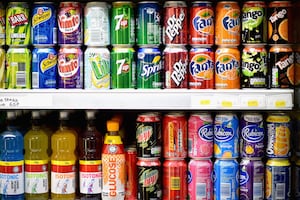Drinks in the UAE will soon be priced depending on the amount of sugar they contain per 100ml under a new amendment to the country's tax laws.
The new pricing system will come into effect from the beginning of 2026, the Ministry of Finance and the Federal Tax Authority (FTA) has confirmed.
The higher the sugar content per 100ml, the higher the tax cost per litre, marking a move away from the current flat fee.
“This amendment is part of the UAE’s broader efforts to promote public health, reduce the consumption of high-sugar products, and encourage manufacturers to lower sugar levels in their beverages,” the ministry said in a statement released on Friday.
“Unlike the previous model, which was based on product classification, the new system ties the tax rate directly to the level of sugar content, and by extension, to the associated health impact.
“This approach incentivises manufacturers to reduce sugar levels and empowers consumers to make more informed dietary choices.”
The UAE introduced an extra tax on sugar-filled soft drinks in 2017, with experts previously telling The National the move had been a great success, leading to decrease in new diabetes cases reported.
A US study released this year estimated that 2.2 million new cases of Type 2 diabetes and 1.2 million new cases of cardiovascular disease occur each year globally due to sugary drinks.
In the Middle East, they directly contributed to about 15 per cent of diabetes cases, the study by researchers at the Gerald J and Dorothy R Friedman School of Nutrition Science and Policy at Tufts University found. The study was published in Nature Medicine.
Doctors back health drive
Dr Ahmed Abdul Karim Hassoun, a consultant endocrinologist at Dubai's Fakeeh University Hospital, said the tax strategy would encourage drink manufactures to reduce sugar levels in their products and help support nationwide efforts to cut diabetes rates.
“This is a commendable public health policy. By linking the tax directly to the sugar content in sweetened beverages, we are encouraging manufacturers to reformulate products with lower sugar levels,” Dr Hassoun said.
“This is particularly important in the fight against obesity, metabolic syndrome, and Type 2 diabetes, all of which are on the rise in the region.
“Reducing added sugars in daily consumption can have a significant long-term impact on preventing these chronic conditions.
“Still, to maximise the impact, this measure should be coupled with awareness campaigns to educate the public about the risks of excessive sugar intake.”
Regional strategy
After sugar taxes were introduced by the UAE and Saudi Arabia in 2017, Oman, Bahrain, Kuwait and Qatar followed suit. The move was motivated by the region’s high rates of obesity and diabetes.
Since then, Bahrain has reported the biggest drop in diabetes, from 19.5 per cent of the population in 2011 to 11.3 per cent in 2021. But that success has not yet been replicated in other Gulf nations.
Oman reported an increase in diabetes rates from 10.5 per cent to 13.8 per cent. In Kuwait, 24.9 per cent of people are now affected, up from 20.7 per cent a decade ago.
Mansoor Ahmed, an independent healthcare expert in the Mena region, has previously told The National that using taxation as a means to promote healthier diets was only one piece of the puzzle.
“While sugar tax does reduce calorie intake, it's not a singular solution to these health conditions. Reducing rates may take years or even decades to fully manifest,” he said.
The biog
Hometown: Cairo
Age: 37
Favourite TV series: The Handmaid’s Tale, Black Mirror
Favourite anime series: Death Note, One Piece and Hellsing
Favourite book: Designing Brand Identity, Fifth Edition
The Sand Castle
Director: Matty Brown
Stars: Nadine Labaki, Ziad Bakri, Zain Al Rafeea, Riman Al Rafeea
Rating: 2.5/5
New UK refugee system
- A new “core protection” for refugees moving from permanent to a more basic, temporary protection
- Shortened leave to remain - refugees will receive 30 months instead of five years
- A longer path to settlement with no indefinite settled status until a refugee has spent 20 years in Britain
- To encourage refugees to integrate the government will encourage them to out of the core protection route wherever possible.
- Under core protection there will be no automatic right to family reunion
- Refugees will have a reduced right to public funds
How much sugar is in chocolate Easter eggs?
- The 169g Crunchie egg has 15.9g of sugar per 25g serving, working out at around 107g of sugar per egg
- The 190g Maltesers Teasers egg contains 58g of sugar per 100g for the egg and 19.6g of sugar in each of the two Teasers bars that come with it
- The 188g Smarties egg has 113g of sugar per egg and 22.8g in the tube of Smarties it contains
- The Milky Bar white chocolate Egg Hunt Pack contains eight eggs at 7.7g of sugar per egg
- The Cadbury Creme Egg contains 26g of sugar per 40g egg
UAE currency: the story behind the money in your pockets
Emergency phone numbers in the UAE
Estijaba – 8001717 – number to call to request coronavirus testing
Ministry of Health and Prevention – 80011111
Dubai Health Authority – 800342 – The number to book a free video or voice consultation with a doctor or connect to a local health centre
Emirates airline – 600555555
Etihad Airways – 600555666
Ambulance – 998
Knowledge and Human Development Authority – 8005432 ext. 4 for Covid-19 queries
more from Janine di Giovanni
'Cheb%20Khaled'
%3Cp%3E%3Cstrong%3EArtist%3A%20%3C%2Fstrong%3EKhaled%3Cbr%3E%3Cstrong%3ELabel%3A%20%3C%2Fstrong%3EBelieve%3Cbr%3E%3Cstrong%3ERating%3A%3C%2Fstrong%3E%204%2F5%3C%2Fp%3E%0A
UAE currency: the story behind the money in your pockets
What sanctions would be reimposed?
Under ‘snapback’, measures imposed on Iran by the UN Security Council in six resolutions would be restored, including:
- An arms embargo
- A ban on uranium enrichment and reprocessing
- A ban on launches and other activities with ballistic missiles capable of delivering nuclear weapons, as well as ballistic missile technology transfer and technical assistance
- A targeted global asset freeze and travel ban on Iranian individuals and entities
- Authorisation for countries to inspect Iran Air Cargo and Islamic Republic of Iran Shipping Lines cargoes for banned goods
CHATGPT%20ENTERPRISE%20FEATURES
%3Cp%3E%E2%80%A2%20Enterprise-grade%20security%20and%20privacy%3C%2Fp%3E%0A%3Cp%3E%E2%80%A2%20Unlimited%20higher-speed%20GPT-4%20access%20with%20no%20caps%3C%2Fp%3E%0A%3Cp%3E%E2%80%A2%20Longer%20context%20windows%20for%20processing%20longer%20inputs%3C%2Fp%3E%0A%3Cp%3E%E2%80%A2%20Advanced%20data%20analysis%20capabilities%3C%2Fp%3E%0A%3Cp%3E%E2%80%A2%20Customisation%20options%3C%2Fp%3E%0A%3Cp%3E%E2%80%A2%20Shareable%20chat%20templates%20that%20companies%20can%20use%20to%20collaborate%20and%20build%20common%20workflows%3C%2Fp%3E%0A%3Cp%3E%E2%80%A2%20Analytics%20dashboard%20for%20usage%20insights%3C%2Fp%3E%0A%3Cp%3E%E2%80%A2%20Free%20credits%20to%20use%20OpenAI%20APIs%20to%20extend%20OpenAI%20into%20a%20fully-custom%20solution%20for%20enterprises%3C%2Fp%3E%0A
MATCH INFO
Hoffenheim v Liverpool
Uefa Champions League play-off, first leg
Location: Rhein-Neckar-Arena, Sinsheim
Kick-off: Tuesday, 10.45pm (UAE)
The specs: 2018 Harley-Davidson Fat Boy
Price, base / as tested Dh97,600
Engine 1,745cc Milwaukee-Eight v-twin engine
Transmission Six-speed gearbox
Power 78hp @ 5,250rpm
Torque 145Nm @ 3,000rpm
Fuel economy, combined 5.0L / 100km (estimate)
Day 1 results:
Open Men (bonus points in brackets)
New Zealand 125 (1) beat UAE 111 (3)
India 111 (4) beat Singapore 75 (0)
South Africa 66 (2) beat Sri Lanka 57 (2)
Australia 126 (4) beat Malaysia -16 (0)
Open Women
New Zealand 64 (2) beat South Africa 57 (2)
England 69 (3) beat UAE 63 (1)
Australia 124 (4) beat UAE 23 (0)
New Zealand 74 (2) beat England 55 (2)
UAE currency: the story behind the money in your pockets
The biog
Favourite books: 'Ruth Bader Ginsburg: A Life' by Jane D. Mathews and ‘The Moment of Lift’ by Melinda Gates
Favourite travel destination: Greece, a blend of ancient history and captivating nature. It always has given me a sense of joy, endless possibilities, positive energy and wonderful people that make you feel at home.
Favourite pastime: travelling and experiencing different cultures across the globe.
Favourite quote: “In the future, there will be no female leaders. There will just be leaders” - Sheryl Sandberg, COO of Facebook.
Favourite Movie: Mona Lisa Smile
Favourite Author: Kahlil Gibran
Favourite Artist: Meryl Streep
Apple%20Mac%20through%20the%20years
%3Cp%3E1984%20-%20Apple%20unveiled%20the%20Macintosh%20on%20January%2024%3Cbr%3E1985%20-%20Steve%20Jobs%20departed%20from%20Apple%20and%20established%20NeXT%3Cbr%3E1986%20-%20Apple%20introduced%20the%20Macintosh%20Plus%2C%20featuring%20enhanced%20memory%3Cbr%3E1987%20-%20Apple%20launched%20the%20Macintosh%20II%2C%20equipped%20with%20colour%20capabilities%3Cbr%3E1989%20-%20The%20widely%20acclaimed%20Macintosh%20SE%2F30%20made%20its%20debut%3Cbr%3E1994%20-%20Apple%20presented%20the%20Power%20Macintosh%3Cbr%3E1996%20-%20The%20Macintosh%20System%20Software%20OS%20underwent%20a%20rebranding%20as%20Mac%20OS%3Cbr%3E2001%20-%20Apple%20introduced%20Mac%20OS%20X%2C%20marrying%20Unix%20stability%20with%20a%20user-friendly%20interface%3Cbr%3E2006%20-%20Apple%20adopted%20Intel%20processors%20in%20MacBook%20Pro%20laptops%3Cbr%3E2008%20-%20Apple%20introduced%20the%20MacBook%20Air%2C%20a%20lightweight%20laptop%3Cbr%3E2012%20-%20Apple%20launched%20the%20MacBook%20Pro%20with%20a%20retina%20display%3Cbr%3E2016%20-%20The%20Mac%20operating%20system%20underwent%20rebranding%20as%20macOS%3Cbr%3E2020%20-%20Apple%20introduced%20the%20M1%20chip%20for%20Macs%2C%20combining%20high%20performance%20and%20energy%20efficiency%3Cbr%3E2022%20-%20The%20M2%20chip%20was%20announced%3Cbr%3E2023%20-The%20M3%20line-up%20of%20chip%20was%20announced%20to%20improve%20performance%20and%20add%20new%20capabilities%20for%20Mac.%3C%2Fp%3E%0A
Top 5 concerns globally:
1. Unemployment
2. Spread of infectious diseases
3. Fiscal crises
4. Cyber attacks
5. Profound social instability
Top 5 concerns in the Mena region
1. Energy price shock
2. Fiscal crises
3. Spread of infectious diseases
4. Unmanageable inflation
5. Cyber attacks
Source: World Economic Foundation


